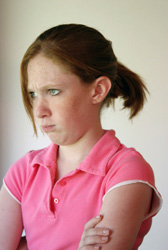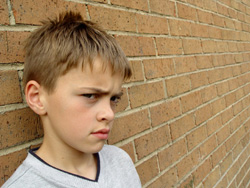
Most adolescents have moments of hate and anger directed at parents. In fact, Dr. Latham explains that if we have children who are consistently docile and trying to please us, we might have children who aren't accomplishing some of the necessary developmental work of adolescence: finding their own identity.
That still doesn't make it easy when your teen is mad at you. When you refuse to let Kevin go to the movie because he lost the privilege and he responds with, “I hate you and wish you'd die,” or Jill gives you glaring looks as you talk about the weekend family plans, what can you do?

Think Back . . .
Dr. Latham invites parents to reflect on their own adolescence, “think for a minute about your relationship to your parents when you were a kid. Did you ever worry about how they felt about anything? Did you ever say to a teenage friend, ‘Out of respect for my parents' feelings I'm not going to ask for the car tonight. In fact, I'm going to be as selfless, loving compassionate, considerate, gentle and kind as I can possibly be.’” (170).
Probably not. In fact, while we look back, many of us will find things we wish we'd never said to our parents—things that make us cringe now that we have a better understanding of life and parenthood.
It may help to remind ourselves that a child's reasons for “hating” his or her parents are probably as meaningless as ours were years ago with our own parents. In fact, because adolescents are still in the process of learning what things mean, “hate” does not carry the same meaning for a child as it does for an adult.
Consider This
Researchers from BYU (Young et al.) remind us that we are always teaching our children (11). We will teach our adolescents how to respond to others anger by the way we respond to hers, therefore, remaining calm is key.
Dr. Latham emphasizes, “it is so important to be in control and to respond appropriately” (172).
You might want to leave the situation for a moment to regain composure in an emotionally charged situation.
This Too Shall Pass
Sometimes it's helpful to have a little mantra you can recite to yourself during such episodes, something along the lines of, “I grew up, and so will she,” or “This too shall pass.” There are moments where as parents the best we can do is just endure.
What A Teen Says
One father, also a parenting expert, was preparing a speech on how to parent adolescents when he asked his eighteen-year-old teenage daughter, “What advice should I give these parents?” She responded, “Tell them to hang in there, Dad. Don't give up. Pretty soon everything will be all right and their kids will love them” (Latham 171).
Stay The Course
Some teens report actually being disappointed in their parents when they've given in to their tirades. Dr. Latham encourages us, “Do not be intimidated by...expressions of hatred. Do not be distraught or plunged into despair because you think you raised an ungrateful, selfish, mean, ugly kid!” (171). You haven't! And holding your ground will go a long way in teaching your child that these behaviors won't help her in the real world.
An Understanding Heart
Be empathic, says Dr. Latham. Let your adolescent know you understand a little of what she's going through. “Do not react in kind to kids' ugliness. Rather, in complete control, and being calm as a summer's morn, respond with empathy” (172). Often teens feel isolated, like no one could possibly understand the depths of their feelings. A statement like “I understand completely,” might not fly, but how about trying something like, “What you're going through sounds really hard”?
How It Sounds
An example in The Power of Positive Parenting walks us through what a parent could say during a short episode where a child is pushing to go to the movie even though the privilege was lost for not doing a chore (Latham 172).
Breathe
Rare is the person who can take a verbal lashing (especially an undeserved one, especially from someone they are trying to help) and remain calm. Allow yourself to take a time out if your teen is mad or angry with you: “My head is spinning and I don't feel like I can be as rational as I want to be. I'll be back in a few minutes” (172).
An Open Heart
Dr. Latham asks us to be open hearted about children who wound us and don't seem to care or notice: “Don't worry that your hurt is completely lost to a kid, eclipsed by his need for self-gratification. Don't agonize over this. It's just all part of the territory” (Latham 171).

One study showed that children of parents who were negative, disapproving, and severe—our “gut” responses to hate and anger—were more likely to have severe behavior problems (Latham 172).
The lesson here is the same as other researchers (Young et al.) have expressed: we are always teaching our children, which includes how we respond to their behavior.
Dr. Latham says it best, “A truly loving, accepting home is one where kids can express hate and anger without being hated and without evoking anger” (173). The more “up” we are, the more our children will be drawn to us, even when they've given us reason to be down.
Sources
Latham, Glenn I. The Power of Positive Parenting: A Wonderful Way to Raise Children. Logan, UT: P&T Ink, 1994.
Young, Richard K., Sharon Black, Michelle Marchant, Katherine J. Mitchem, and Richard P. West. “A Teaching Approach to Discipline: An Alternative to Punishment." Marriage & Families, August (2000): 9-15.